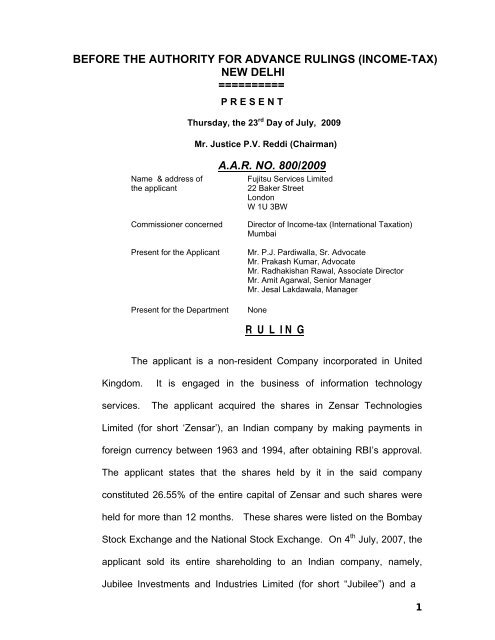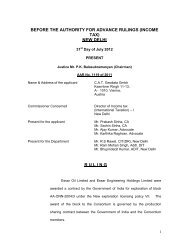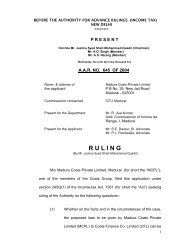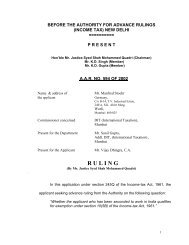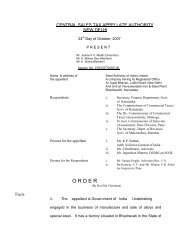(income-tax) new delhi ========== aar no. 800/2009 ruling
(income-tax) new delhi ========== aar no. 800/2009 ruling
(income-tax) new delhi ========== aar no. 800/2009 ruling
Create successful ePaper yourself
Turn your PDF publications into a flip-book with our unique Google optimized e-Paper software.
BEFORE THE AUTHORITY FOR ADVANCE RULINGS (INCOME-TAX)<br />
NEW DELHI<br />
<strong>==========</strong><br />
P R E S E N T<br />
Thursday, the 23 rd Day of July, <strong>2009</strong><br />
Mr. Justice P.V. Reddi (Chairman)<br />
Name & address of<br />
the applicant<br />
A.A.R. NO. <strong>800</strong>/<strong>2009</strong><br />
Fujitsu Services Limited<br />
22 Baker Street<br />
London<br />
W 1U 3BW<br />
Commissioner concerned<br />
Present for the Applicant<br />
Director of Income-<strong>tax</strong> (International Taxation)<br />
Mumbai<br />
Mr. P.J. Pardiwalla, Sr. Advocate<br />
Mr. Prakash Kumar, Advocate<br />
Mr. Radhakishan Rawal, Associate Director<br />
Mr. Amit Agarwal, Senior Manager<br />
Mr. Jesal Lakdawala, Manager<br />
Present for the Department None<br />
R U L I N G<br />
The applicant is a <strong>no</strong>n-resident Company incorporated in United<br />
Kingdom. It is engaged in the business of information tech<strong>no</strong>logy<br />
services. The applicant acquired the shares in Zensar Tech<strong>no</strong>logies<br />
Limited (for short ‘Zensar’), an Indian company by making payments in<br />
foreign currency between 1963 and 1994, after obtaining RBI’s approval.<br />
The applicant states that the shares held by it in the said company<br />
constituted 26.55% of the entire capital of Zensar and such shares were<br />
held for more than 12 months. These shares were listed on the Bombay<br />
Stock Exchange and the National Stock Exchange. On 4 th July, 2007, the<br />
applicant sold its entire shareholding to an Indian company, namely,<br />
Jubilee Investments and Industries Limited (for short “Jubilee”) and a<br />
1
Cyprus company, namely, Pedria<strong>no</strong> Investments Ltd. (for short<br />
“Pedria<strong>no</strong>”)<br />
for a consideration of Rs. 195/- per share. A copy of the<br />
Share Purchase Agreement dated 1.3.2007 has been annexed to the<br />
application.<br />
2. It may be submitted at this juncture that the name of Pedria<strong>no</strong> has<br />
<strong>no</strong>t figure in the Share Purchase Agreement. The applicant clarifies that<br />
the Pedria<strong>no</strong> is a wholly owned subsidiary of Petrochem International<br />
Limited (Petrochem).<br />
Petrochem a company incorporated in India is a<br />
wholly owned subsidiary of Jubilee which is one of the purchasers of<br />
shares and a party to the Share Purchase Agreement. As per the said<br />
agreement, the applicant had agreed to sell the shares of Zensar to the<br />
purchaser or to its affiliates. In view of the wide definition of “affiliate”, the<br />
applicant submits that any entity that is controlled by the purchaser or<br />
under common control along with the purchaser will satisfy the definition<br />
and therefore Pedria<strong>no</strong> qualifies as an affiliate of Jubilee and became<br />
eligible to buy the shares.<br />
The <strong>tax</strong> was deducted by Jubilee and Pedria<strong>no</strong> from the sale<br />
consideration @ 20%, though according to the applicant, the correct rate<br />
applicable to long term capital gain is 10%. The following questions are<br />
framed for seeking advance <strong>ruling</strong> from this Authority:<br />
1. Whether on the stated facts and in law, the rate of <strong>tax</strong> applicable<br />
on the long term capital gains arising on sale of shares of<br />
Zensar Tech<strong>no</strong>logies Limited will be 10% (plus applicable<br />
surcharge and education cess) as per the proviso to section<br />
112(1) of the Act?<br />
2. Whether the beneficial rate of 10% can be applied where the 2
long term capital gain arisen to the Applicant on sale of shares<br />
of Zensar Tech<strong>no</strong>logies Limited are computed by applying<br />
Section 48 of the Income-<strong>tax</strong> Act read with first proviso to<br />
Section 48 and Rule 115A?<br />
The questions are overlapping and they can be dealt with together.<br />
3. The answer to the questions calls for interpretation of the first<br />
proviso to section 112(1) of the Income-<strong>tax</strong> Act, 1961 (Act). The<br />
contention of the applicant is that the <strong>income</strong> from capital gain arising from<br />
the transfer of shares answering the description of listed securities held for<br />
more than 12 months is liable to be <strong>tax</strong>ed at 10% irrespective of the <strong>no</strong>napplicability<br />
of the second proviso to section 48 (which provides for the<br />
benefit of indexation). It is submitted that the proviso to section 112(1)<br />
applies to both residents and <strong>no</strong>n-residents as the proviso does <strong>no</strong>t make<br />
any distinction between these two categories of assessees. In other<br />
words, the <strong>no</strong>n-resident foreign company is <strong>no</strong>t disentitled to invoke the<br />
proviso to section 112(1) on the ground that it is <strong>no</strong>t eligible to get the<br />
benefit of the second proviso to section 48. Further, it is the contention of<br />
the applicant that the lower rate of <strong>tax</strong> should be available despite the fact<br />
that the benefit of the first proviso to section 48 has been availed of by the<br />
foreign/<strong>no</strong>n-resident company.<br />
4. Section 112(1) sets out the rate at which the <strong>tax</strong> is payable on long<br />
term capital gains both in relation to residents and <strong>no</strong>n-residents. The<br />
<strong>no</strong>rmal rate is 20%. However, the proviso to section 112(1) prescribes the<br />
lesser rate of 10% in the case of transfer of specified long term capital<br />
assets, namely listed Securities or Unit or Zero Coupon Bond. The<br />
relevant part of the section 112(1) is extracted hereunder:<br />
3
“Tax on long-term capital gains.<br />
112. (1) Where the total <strong>income</strong> of an assessee includes any <strong>income</strong>,<br />
arising from the transfer of a long-term capital asset, which is chargeable<br />
under the head “Capital gains”, the <strong>tax</strong> payable by the assessee on the<br />
total <strong>income</strong> shall be the aggregate of,—<br />
(a) to (b) xx xx xx xx xx xx xx xx xx<br />
(c) in the case of a <strong>no</strong>n-resident (<strong>no</strong>t being a company) or a<br />
foreign company,—<br />
(i) the amount of <strong>income</strong>-<strong>tax</strong> payable on the total <strong>income</strong> as<br />
reduced by the amount of such long-term capital gains, had the total<br />
<strong>income</strong> as so reduced been its total <strong>income</strong> ; and<br />
(ii) the amount of <strong>income</strong>-<strong>tax</strong> calculated on such long-term capital<br />
gains at the rate of twenty per cent ;<br />
(d) xx xx xx xx xx xx xx xx xx<br />
[Provided that where the <strong>tax</strong> payable in respect of any <strong>income</strong> arising<br />
from the transfer of a long-term capital asset, being listed securities or<br />
unit or zero coupon bond, exceeds ten per cent of the amount of capital<br />
gains before giving effect to the provisions of the second proviso to<br />
section 48, then, such excess shall be ig<strong>no</strong>red for the purpose of<br />
computing the <strong>tax</strong> payable by the assessee.<br />
xx xx xx xx xx xx xx xx xx”<br />
5. There is <strong>no</strong> doubt that the shares held by the applicant in Zensar<br />
answer the description of listed securities as defined by the Explanation to<br />
section 112(1) read with Securities Contracts (Regulations) Act. What<br />
needs to be considered therefore is whether the applicant could invoke<br />
the benefit of lesser rate of <strong>tax</strong> provided for by the proviso to section<br />
112(1). This Authority has taken a consistent view that a <strong>no</strong>n-resident<br />
company can also seek the benefit of the proviso to section 112(1) vide<br />
its <strong>ruling</strong>s in Timken France SAS, In Re 1 , McLeod Russel Kolkata Ltd., In<br />
Re 2<br />
and Burmah Castrol Plc., In Re 3 . This Authority refuted the<br />
contention of the Department that the expression “before giving effect to<br />
the second proviso to section 48” pre-supposes the existence of a case<br />
where the computation of long term capital gains could be made in<br />
1 294 ITR 513(AAR)<br />
2 (2008) 215 CTR 230)<br />
3 (<strong>2009</strong>) 221 CTR 63<br />
4
accordance with the formula contained in the second proviso to section<br />
48. As the second proviso to section 48 is <strong>no</strong>t applicable to the <strong>no</strong>nresident,<br />
the proviso to section 112(1) does <strong>no</strong>t come into play according<br />
to the Revenue. These contentions on behalf of the Revenue were<br />
rejected and it was held that the benefit of lesser rate of <strong>tax</strong> conferred by<br />
the proviso to section 112(1) can as well be invoked by a <strong>no</strong>n-resident,<br />
like the applicant. The words “before giving effect to 2 nd proviso to section<br />
48” only mean that the calculation under the 2 nd proviso shall <strong>no</strong>t enter<br />
into the computation of capital gain, wherever that proviso is applicable.<br />
The said expression can<strong>no</strong>t be construed as a condition precedent for<br />
invoking the proviso to section 112(1). The following passage from Timken<br />
France may be usefully quoted in this context:<br />
“In plain and peremptory words, the proviso limits the rate of <strong>tax</strong> on the<br />
gains from the transfer of listed securities to 10 per cent, but, with an<br />
important rider that the quantum of capital gains should be arrived at<br />
without taking into account the formula laid down in the second proviso<br />
to section 48 based on the indexed cost of acquisition. In other words,<br />
while computing the capital gains on the listed securities held for more<br />
than 12 months, do <strong>no</strong>t give effect to the calculation spelt out in the<br />
second proviso to section 48 wherever it is applicable, or to put it in a<br />
different language, let <strong>no</strong>t the indexation formula enter into the<br />
computation process – that is the mandate of controversial phrase in<br />
the proviso to section 112(1). It does <strong>no</strong>t say – deny the concessional<br />
rate of <strong>tax</strong> to the category of assesses who are <strong>no</strong>t eligible to have the<br />
benefit of indexed cost of acquisition under the second proviso. In<br />
other words, the eligibility to avail the benefit of indexed cost of<br />
acquisition (under the second proviso to Section 48) is <strong>no</strong>t a sine qua<br />
<strong>no</strong>n for applying the reduced rate of 10 per cent prescribed by the<br />
proviso to section 112(1). The second proviso to section 48 is only a<br />
mode of computation of capital gains. The crucial words relied upon by<br />
the Revenue can<strong>no</strong>t be construed as the words of exclusion of a<br />
category of assesses i.e. <strong>no</strong>n-residents who can<strong>no</strong>t avail of indexation<br />
benefit.”<br />
5
It was also held that the availment of the protection of fluctuation in<br />
rupee value in terms of foreign currency in accordance with the first<br />
proviso to section 48, does <strong>no</strong>t come in the way of a <strong>no</strong>n-resident invoking<br />
the proviso to section 112(1). The Authority also referred to the decision of<br />
the Income-<strong>tax</strong> Appellate Tribunal. “H” Bench, Mumbai in ITA No. 2552 of<br />
2005 (BASF Aktiengesellschaft v. Deputy DIT (International <strong>tax</strong>ation) 4<br />
and expressed disagreement with the view taken by the Tribunal. I am<br />
told by the learned counsel for the applicant that more than one Bench of<br />
ITAT took a different view subsequently. Be that it as may, the <strong>ruling</strong>s<br />
cited supra fully cover the issue raised in this application.<br />
6. The Revenue has <strong>no</strong>t furnished any comments, probably, for the<br />
reason that the question raised is squarely covered by the previous <strong>ruling</strong>s<br />
of this Authority.<br />
7. In the result, both the questions are answered in the affirmative and<br />
it is held that the applicant is liable to pay <strong>tax</strong> at the lesser rate of 10% as<br />
per the proviso to section 112(1) of the Act apart from the surcharge and<br />
cess.<br />
Accordingly the <strong>ruling</strong> is given and pro<strong>no</strong>unced on 23 rd July, <strong>2009</strong>.<br />
Sd/-<br />
(P.V. Reddi)<br />
Chairman<br />
F.No. AAR/<strong>800</strong>/<strong>2009</strong> Dated: 23/7/<strong>2009</strong><br />
This copy is certified to be a true copy of the order is sent to:-<br />
1. The applicant.<br />
2. The Director of Income-<strong>tax</strong> (International Taxation), Mumbai.<br />
(Batsala Jha Yadav)<br />
Addl. Commissioner of Income-<strong>tax</strong><br />
4 (2007) 293 ITR (AT) 1 (Mumbai)<br />
6


